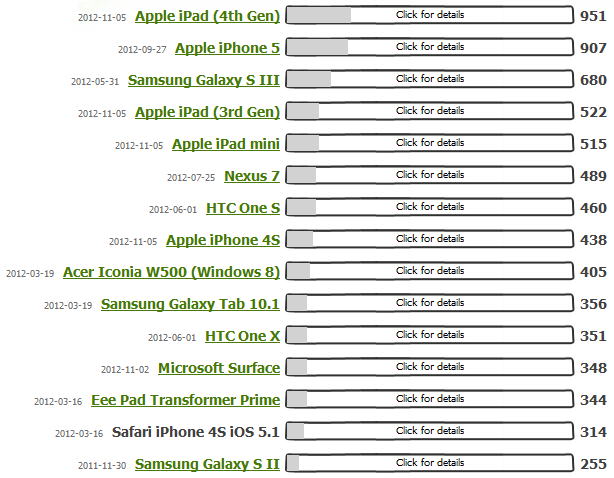With Microsoft's tablet offering finally in the wild, Futuremark took to Peacekeeper – its own "universal" benchmark suite – in order to determine how Surface stacks up against its competition. Perhaps surprisingly, benchmark monkeys discovered that Surface's test performance falls well behind leading competitors and that of higher-end smartphones.
Contrary to the many reviews which applaud the snappy responsiveness of Surface's multi-gesture-capable UI, Futuremark's synthetic tests indicate Apple's latest iPad man-handles HTML5 three times faster than Microsoft's $499 tablet. In fact, Surface – which scored 348 points on Peacekeeper – even falls behind the 3rd-gen iPad (522), the iPad Mini (515) and the Nexus 7 (522).
Tablets aside, the iPhone 5 (907), Galaxy S III (680) and HTC One S (460) were the three top-scoring smartphones on the list, all of which managed to best Surface by rather cushy margins.

It's important to note that Peacekeeper is a browser-based benchmark, not unlike Google's Octane. The fact Peacekeeper runs from a browser is an obvious indicator of its software dependence and thus the major culprit on Surface's low results is bound to be IE10.
Speaking of which, Tom's Hardware shows Surface performing just as poorly under other browser-based benchmarks, including well-known tests like V8, Octane and Sunspider. Since Surface is powered by the same silicon found in the Nexus 7 – a 1.3GHz Tegra 3 – it seems evident Surface's benchmark-envy is likely a software issue. The Android-toting Nexus 7 performed almost twice as well under most benchmarks with its own browser.
So, is Surface's benchmark woes an issue with Windows 8 RT? IE10 mobile? Is it a bug, poor optimization or simply working as intended? For now, we can't really be certain However, the upshot here is that the tablet's performance may significantly improve through future software updates. That, at least, ought to give Surface owners a little something to look forward to.